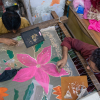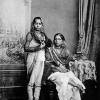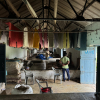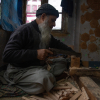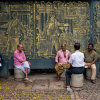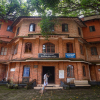Once upon a time there was a man who built a house in a forest, even as his brother had built a house in another part of the same forest. To make the place secure, he built a high wall around it. To ward off robbers and thieves, he kept a squad of dogs, and bought a rifle. One day he had a feeling that there was a robber in the forest. He was afraid the robber would surprise him with a sudden attack. So he loaded his gun, and went to search for the miscreant. He felt the intruder rustling in the grass. He saw footprints and went after them. He thought he saw him at last or at least his substantial shadow. So he fired at the intruder. There were two shots fired. Two people lay dead. The brothers, each of them suspecting a marauder, had killed each other.
I don’t know why, whenever I hear of a communal riot, or of Indo-Pak tension, or an Israeli-Arab conflict, this story comes to my mind. Fear leads to hatred—hatred leads to violence of language and of temper—violence leads to mutual slaughter!
Who killed India? I asked in my next Last Page. Yes, indeed, who did?
Was it the work of an insane individual, a stab in the back as in a communal riot; or the diabolical conspiracy of a gang? Was it a case of slow poisoning? Or, as it might be, was it a more diabolical, a more cunning master plan, in which the victim himself was hypnotically induced to commit suicide.
India was killed by Britain. The first blow was struck when the British (after ignoring and neglecting them for half a century after the events of 1857) instigated and encouraged the Muslims to demand separate electorates and then conceded it. That was the first step towards Pakistan, however copious the tears Lord Mountbatten may now shed over the mortal remains of United India.
India was killed by the British and their 'Divide and Rule' policy—but not by the British alone. India was killed by fanatical Muslim Leaguers who played upon the community's apprehensions and fears to produce in them a peculiar psychosis which was a dangerous combination of inferiority complex, aggressive jingoism, religious fanaticism and fascistic Herrenvolk legends.
India was killed by the fanatical Hindus, the Hindu fascists and Hindu imperialists, the dreamers of a Hindu empire, the crusaders of Hindu Sangathan, who provided the ideological fuel for the fire of Hindu communalism and fanaticism.
India was killed by the Hindu communalists, the believers and supporters of Hindu exclusiveness...who yet masqueraded as Nationalists and Congressmen, who prevented the National congressmen and the National Movement from becoming a fully representative, completely non-communal front of all Indian patriots.
India was killed by the Communist Party of India which (during the days of its 'People's War' and 'pro-Pakistan' policies) provided the Muslim separatists with an ideological basis for the irrational and anti-national demand for Pakistan. (Phrases like 'homeland,' 'nationalities,' 'self-determination' etc…were all ammunition supplied by the Communists to the legions of Pakistan.)
India was killed, and stabbed in the heart, by every Hindu who killed a Muslim, by every Muslim who killed a Hindu, by every Hindu or Muslim who committed or abetted or connived at arson, rape and murder during the recent (and earlier) communal riots.
That an imperialist power planned the dismemberment of our country in the very hour of our freedom is not surprising. The wonder, and the tragedy, is that India should have been killed by the children of India.
(From I Am Not An Island: An Experiment in Autobiography, 1977. Vikas Publishing House, New Delhi)

